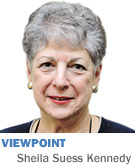Subscriber Benefit
As a subscriber you can listen to articles at work, in the car, or while you work out. Subscribe Now
 Pundits and academicians are grasping for theories that might explain the bizarre political environment in which America finds itself. As we head into the 2016 election season, the word “unprecedented” is in danger of being overused.
Pundits and academicians are grasping for theories that might explain the bizarre political environment in which America finds itself. As we head into the 2016 election season, the word “unprecedented” is in danger of being overused.
Perhaps the most cogent description of that environment was offered by New York Times columnist David Brooks, who suggested in a recent, thoughtful column that Americans are abandoning traditional notions of politics:
Politics is an activity in which you recognize the simultaneous existence of different groups, interests and opinions. You try to find some way to balance or reconcile or compromise those interests, or at least a majority of them. You follow a set of rules, enshrined in a constitution or in custom, to help you reach these compromises in a way everybody considers legitimate.
The downside of politics is that people never really get everything they want. It’s messy, limited and no issue is ever really settled. Politics is a muddled activity in which people have to recognize restraints and settle for less than they want. Disappointment is normal.
Another way of saying the same thing is that “politics,” as Brooks defines it, is an activity engaged in by adults. It requires a certain degree of maturity and life experience, an ability to defer gratification and respect differences. Policy-free exchanges of insults are anything but adult.
The question, of course, is how and why did we get to this point?
William Butler Yeats’ much-quoted lines may offer a clue.
Things fall apart; the center cannot hold;
Mere anarchy is loosed upon the world,
The blood-dimmed tide is loosed, and everywhere
The ceremony of innocence is drowned;
The best lack all conviction, while the worst
Are full of passionate intensity.
We live in a time of enormous technological and social change. Such times are always disorienting, but there are aspects of today’s collective life that distinguish our current experience from that of previous periods.
The Internet puts enormous information resources at our fingertips, but it also connects us to massive amounts of misinformation, disinformation and propaganda. At the same time, we have lost much of what has been called “news of verification,” the traditional journalism that—for good or ill—operated as gatekeeper and guide to what we needed to know.
Add in economic insecurity, the rise of terrorism, the existential threat posed by climate change, and daily revelations about untrustworthy behaviors of those in charge of American institutions—bankers, politicians, church leaders, sports figures—and you generate pervasive fear and distrust.
When the center cannot hold, people are desperate for reassurance, for bright lines and easy answers. We retreat from adult behavior and yearn for someone to be “daddy”—a strong presence, a buffer between us and the complexities of modern life, someone who will protect us from uncertainty and the bad guys.
University of Massachusetts Professor Matthew McWilliams surveyed supporters of Donald Trump:
I’ve found a single statistically significant variable predicts whether a voter supports Trump—and it’s not race, income or education levels: It’s authoritarianism.
Running a standard statistical analysis, I found that education, income, gender, age, ideology and religiosity had no significant bearing on a Republican voter’s preferred candidate. Only two of the variables I looked at were statistically significant: authoritarianism, followed by fear of terrorism, though the former was far more significant than the latter.
This response to a complicated and largely unmapped new world is entirely understandable. Unfortunately, as history teaches us, it can also be very dangerous.•
__________
Kennedy is a professor of law and public policy at the School of Public and Environmental Affairs at IUPUI. She can be reached at [email protected].
Please enable JavaScript to view this content.
